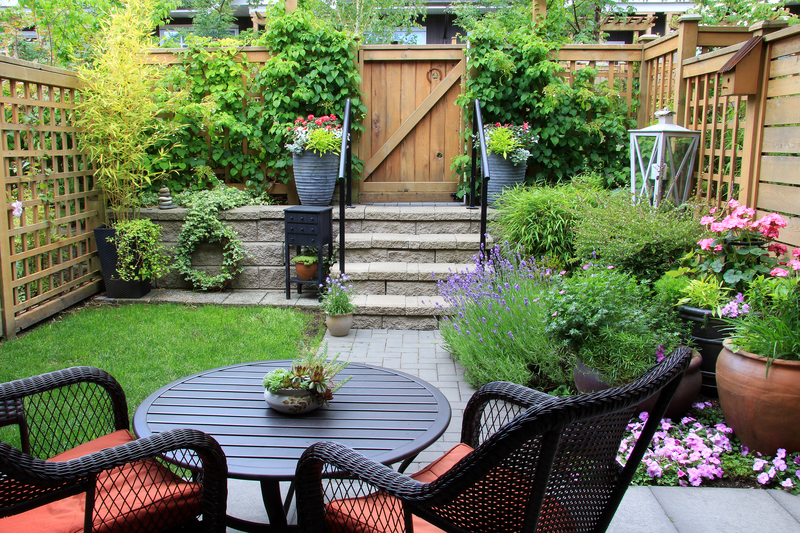Embrace Peace with Calming Zen Garden Concepts
Posted on 17/06/2025
Embrace Peace with Calming Zen Garden Concepts
In today's fast-paced and often chaotic world, finding tranquility can seem like an insurmountable challenge. However, the ancient Zen garden is more than just an art form; it's a gateway to inner peace and a serene home environment. Whether you have a sprawling backyard or a small balcony, embracing calming Zen garden concepts can transform your space into an oasis of stillness. This comprehensive guide will introduce you to the principles, styles, and practical tips for cultivating a peaceful sanctuary inspired by traditional Japanese wisdom.
Table of Contents
- The Meaning and Philosophy Behind Zen Gardens
- Essential Elements of a Calming Zen Garden
- Popular Zen Garden Designs and Styles
- Benefits of Calming Zen Garden Concepts
- How to Create a Zen Garden at Home
- Popular Accessories for Zen-Inspired Spaces
- Maintaining Your Zen Sanctuary
- Conclusion
The Meaning and Philosophy Behind Zen Gardens
At their core, Zen gardens (also known as karesansui or Japanese rock gardens) are meticulously arranged landscapes designed to encourage meditation and contemplation. Originating from Buddhist monasteries in 14th-century Japan, these gardens are rooted in the philosophy of simplicity, balance, and harmony.
- Minimalism: By featuring only essential elements, Zen gardens eliminate clutter and induce mindfulness, allowing the mind to rest.
- Natural Beauty: The use of stones, sand, and carefully selected plants mirrors the beauty of the natural world, even in the smallest of urban spaces.
- Symbolism: Every feature--whether it's a raked gravel pattern or a mossy rock--has symbolic meaning, representing aspects of nature like mountains, rivers, or islands.
- Mindfulness and Meditation: Zen gardens are designed to be experienced rather than simply admired. Their tranquil ambiance encourages reflection and meditation.
Embracing Zen garden ideas is about more than landscaping--it's about cultivating a peaceful state of mind right at home.
Essential Elements of a Calming Zen Garden
A genuine Zen-inspired garden relies on a few key components. While styles can vary, these elements are typically present in most calming Zen gardens:
1. Rocks and Stones
- Boulders: Positioned to evoke mountains or islands, these represent endurance and stability.
- Pebbles and Gravel: Often raked into patterns, these stand in for water, waves, or clouds, creating movement and texture.
2. Sand
- Raked Sand: The act of carefully raking sand into ripples or lines is both meditative and symbolic, representing water's flow or the impermanent nature of life.
3. Plants
- Moss: Used for its lush, low-maintenance appeal and ability to evoke timelessness.
- Bamboo: Symbolizes strength and flexibility.
- Evergreens: Provide year-round beauty and resilience.
- Carefully Pruned Bushes or Trees: Shaped for symmetry, promoting focus and discipline.
4. Water Features (Optional)
- Ponds, streams, or simple stone basins can add soothing sounds, reflecting the principles of calm and reflection.
5. Bridges and Pathways
- Stone paths: Encourage mindful strolling and symbolize personal journeys.
6. Decorative Features
- Lanterns, pagodas, and statues: Provide visual interest and reinforce the serene, traditional atmosphere.
Popular Zen Garden Designs and Styles
Whether you have an expansive outdoor space or a compact urban garden, there's a Zen garden concept suited for your needs. Here are popular styles to inspire your transformation:
1. Karesansui (Dry Landscape) Gardens
- Characterized by raked sand or gravel, artfully placed rocks, and minimal plant life. Focus is on simplicity and symbolism rather than elaborate displays.
2. Tsubo-niwa (Courtyard Gardens)
- Ideal for urban environments or small spaces, these mini Zen gardens bring tranquility to patios, balconies, or even indoors.
3. Strolling or Pond Gardens
- Larger spaces may incorporate water elements and winding paths designed for leisurely walks, balancing the meditative with the picturesque.
4. Indoor Zen Garden Concepts
- Tabletop Zen gardens with sand, rocks, and tiny rakes are perfect for workspaces, offering a quick escape from daily stress.
Benefits of Calming Zen Garden Concepts
Why are Zen gardens so highly regarded? Their advantages extend beyond aesthetics:
- Stress Reduction: The peaceful layout and repetitive motions involved in raking or pruning have been shown to calm the mind and reduce anxiety.
- Encourages Mindfulness: Tending the garden or simply observing its elements encourages living in the moment.
- Improved Focus and Creativity: Minimalist environments free the mind to focus, making them outstanding spaces for meditation or creative inspiration.
- Enhanced Curb Appeal: A Zen-inspired landscape can boost the value and aesthetic of your property.
- Low Maintenance: Once established, many Zen gardens require minimal upkeep compared to traditional gardens.
- Year-Round Enjoyment: Evergreen selections and non-living features offer beauty in all seasons.
How to Create a Zen Garden at Home
Ready to embrace peace with calming Zen garden concepts? Here's a step-by-step approach for beginners and enthusiasts alike:
Step 1: Select Your Space
- Choose an area that receives partial sunlight--corner of a yard, balcony, or even a tabletop for indoor gardens.
Step 2: Plan the Layout
- Sketch your garden's design. Consider where each major element--rocks, sand, pathways, and plants--will be placed for optimal balance and flow.
Step 3: Prepare the Ground
- Remove any existing grass or debris, level the earth, and use a weed barrier if desired.
Step 4: Add Hardscape Elements
- Place large rocks or boulders as focal points. Arrange them in odd groupings to mimic natural settings.
- Create winding paths using stepping stones, gravel, or wood.
Step 5: Incorporate Sand or Gravel
- Spread an even layer and use a rake to make flowing patterns--straight lines for calm, swirls for energy.
Step 6: Plant Selection and Placement
- Integrate moss, evergreens, bamboo, or Japanese maples sparingly. Shape them to promote order and tranquility.
Step 7: Accessorize Tastefully
- Add a stone lantern or basin, but avoid overcrowding. Remember: less is more in Zen design.
Step 8: Maintain Your Zen Retreat
- Regularly rake gravel, prune plants, and keep surfaces free of debris to retain a pristine look.
Popular Accessories for Zen-Inspired Spaces
Enhance your calming Zen garden idea with these timeless features:
- Stone lanterns: Cast a soft glow at dusk, adding mystique.
- Water basins: Invite guests to symbolically cleanse hands before entering.
- Bamboo fences or screens: Create privacy and natural division.
- Benches or meditation seats: Offer spots for rest and reflection.
- Bridges: Symbolize transition and encourage contemplation.
For best results, maintain harmony with the garden's overall balance and avoid over-decoration.
Maintaining Your Zen Sanctuary
A peaceful Zen garden should remain a place of order and beauty. Here are some maintenance tips to uphold the calming effect:
- Regular Raking: Smooth out sand or gravel to erase footprints and renew patterns.
- Pruning: Trim plants to maintain neat shapes and prevent overgrowth.
- Cleaning: Remove fallen leaves, debris, and algae from water features.
- Weed Control: Use natural mulch or a landscape fabric to prevent unwanted growth.
Maintenance also doubles as a form of mindful meditation; focus on each small task, and let worries fade away, reinforcing the tranquility of your sanctuary.
Conclusion: Welcome Calm and Balance into Your Life
Embracing Zen garden concepts is not just about improving your landscape--it's a profound shift towards tranquility, clarity, and inner peace. Whether you seek a place for meditation, stress relief, or simply a beautiful view, a calming Zen garden can provide all these and more. By understanding the philosophies, essential elements, and practical steps outlined above, anyone can create a peaceful retreat--no matter the size of your space or budget.
So why wait? Begin your journey today and let the gentle spirit of Zen infuse your surroundings, helping you embrace peace with every stone, leaf, and grain of sand!


Latest Posts
Can Your Garden Help Battle Climate Change? Discover How
Discover the Secrets to Creating a Vibrant Herb Garden
Shade Seekers: Rediscovering Dark Corners with Climbers
Transform Your Garden with Expert Seating Arrangement Tips
Creating Adventures: Steps to Building a Child-Friendly Garden

